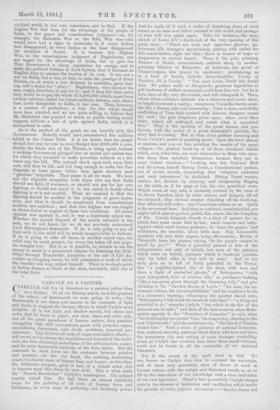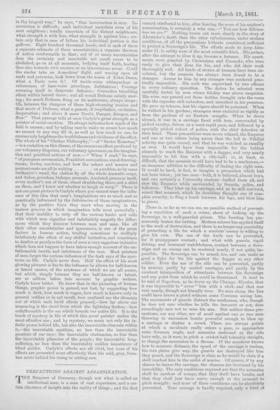CARLYLE AS A PAINTER.
CARLYLE will live in literature as a painter, rather than as a thinker. Of all our literary artists, lie is the greatest of the school,—of Rembrandt we were going to write,—but Rembrandt is too sharp and narrow in his contrasts of light and shade, to suggest the, literary effects in which Carlyle most delights. It is not light and shadow merely, but chaos and
order, that he loves to paint ; nor even chaos and order only, but all the great paradoxes of human nature, fiery passions
struggling with stiff conventions, panic with purpose, vague, smouldering discontent, with shrill, confident, punctual pre- cisianism. Nay, he loves all sorts of vague cumulative effects,— iv ill crowd on his canvas the stupidities and frenzies of the multi- tude, the thin rhetorical melodrama of the self-conscious orator, and the grim democratic audacity of the born leader. But the contrasts he most loves are the contrasts between passion and purpose,—on the one hand, the seething, fermenting yeast of a chaotic mass of human fears and hopes ; on the other, the deliberate purpose, good or bad, of a potent mind, able to impress upon this chaos its own drift. This is what made the " French Revolution" Carlyle's masterpiece. The subject exactly suited him. He had there an almost indefinite scope for the painting of all sorts of human force and feebleness, in every stage of gathering and declining power. And he made of it such a series of dissolving views of vivid scenes as no man ever before painted iu this world, and perhaps no man will ever paint again. Take, for instance, the terse sketch of Louis XV.'s death-bed, at the very opening of this great story :—" There are nods- and sagacious glances ; go- betweens, silk dowagers mysteriously gliding, with smiles for this constellation, sighs for that ; there is tremor of hope or desperation in several hearts. There is the pale, grinning Shadow of Death, ceremoniously ushered along by another grinning Shadow of Etiquette ; at intervals, the growl of Chapel-organs, like prayer by machinery ; proclaiming, as in a kind of horrid, diabolic horse-laughter, Vanity of Vanities, All is Vanity." "Yes, poor Louis, Death has found thee. No palace walls or life-guards, gorgeous tapestries or gilt buckram of stiffest ceremonial, could keep him out ; but he is here, here at thy very life-breath, and will extinguish it. Thou, whose whole existence hitherto was a chimeara and scenic show, at length becomest a reality ; sumptuous Versailles bursts asun- der like a Dream, into void immensity ; Time is done, and all the scaffolding of Time falls crushed with hideous clangour round thy soul ; the pale kingdoms yawn open ; there must thou enter, naked, all uuking'd, and await what is appointed thee." That is the, opening of the great drama, and pre- figures, with the power of a great dramatist's prelude, the story that is coming. But as that story gathers meaning and force, Carlyle's power of painting grows. Open the book almost. at random, and you see him painting the results of the great collapse,—the gradual break-up of all those simulated beliefs which, even when true, are more destructive to those who simu- late them than unbeliefs themselves, because they end in. more violent reaction :—" Looking into this National Hall and its scenes, behold Bishop Tornio, a Constitutional prelate,, not of severe morals, demanding that religious costumes and such caricatures' be abolished. Bishop Torn6 warms, catches fire, finishes by untying, and indignantly flinging on the table, as if for gage or bet, his own pontifical cross. Which cross, at any rate, is instantly covered by the cross of To-Deum Fauchet, then by other crosses and insignia, till all are stripped ; this clerical senator clutching off his skull-cap, that other his frill-collar,----lest Fanaticism return on us. Quick is the movement here ! And then so confused, unsubstantial, you might call it almost spectral, pallid, dim, inane, like the Kingdom of Die. Unruly Linguet, shrunk to a kind of spectre for us, pleads here some cause that he has ; amid rumour and inter- ruption which excel human patience ; he 'tears his papers' and withdraws, the irascible, adult little man. Nay, honourable members will tear their papers, being effervescent ; Merlin of Thiouville tears his papers, crying, So the people cannot be saved by you!'" What a powerful picture is this of the deliquescence not only of beliefs, but even of the patience which rests on beliefs, patience which is rendered possible only by belief alike in God and in man I And so the story goes on to tell of Paris patrolled in the Terror, like "a naphtha-lighted city of the dead, with here and there a flight of perturbed ghosts," of Robespierre, " with eyes red-spotted, fruit of extreme bile," as perchance walking "like a sea-green ghost through the blooming July," and pro- claiming to his " Jacobin House of Lords " " his woes, his un- common virtues, his incorruptibilities," and his readiness to die at a moment's warning ; whereupon the painter David cries, "Robespierre, I will drink the hemlock with thee,"—" a thing not essential to do," remarks Carlyle, "but which in the fire of the moment can be said ;" and then of the last moment, when Robe- spierre appeals to the "President of Assassins" in vain, when "his frothing lips are grown 'blue,' his tongue dry, cleaving to the roof of his mouth," and the mutineers cry, " The blood of Denton chokes him." Such a series of pictures of national fermenta- tion, national anarchy, national blood-thirst, with here and there the temporary rise and setting of some stronger controlling mind, as Carlyle has crowded into these three small volumes, could not be found in all the remainder of our national literature.
Nor is the secret of the spell hard to find. No one knows as Carlyle does how to contrast the uncertain, and at most only guessable, store of forces at work in human nature, with the certain and historical result, so as to fill up the interstices of our knowledge with a clear indication of our vast ignorance. Observe how powerfully Carlyle always puts in the element of hesitation and vacillation which marks the growth of every popular movement :—" Reader, fancy not in thy languid way," he says, " that insurrection is easy. In- surrection is difficult ; each individual uncertain oven of his next neighbour ; totally uncertain of his distant neighbours, what strength is with him, what strength is against him ; cer- tain only that in case of failure his individual portion is the gallows. Eight hundred thousand heads, and in each of them a separate estimate of these uncertainties, a separate theorem of action conformable to that; out of so many uncertainties does the certainty and inevitable net result never to be abolished, go on at all moments, bodying itself forth, leading thee also towards civic crowns, or an ignominious noose. Could the reader take an Asmodeus' flight, and waving open all roofs and privacies, look down from the tower of Notre Dame, what a Paris were it ! Of treble-voice whimporings or vehemence, of bass-voice growlings, dubitations ; Courage screwing itself to desperate defiance ; Cowardice trembling silent within barred doors ; and all round Dulness calmly snor- ing; for much Dulness, flung on its mattresses, always sleeps ; Oh, between the clangour of these high-storming tocsins and that snore of Dulness, what a gamut, of trepidation, excitation, desperation ; and above it mere Doubt, Danger, Atropos, and Nox." That passage tells at once Carlyle's great strength as a painter of social emotion. Ho always indicates how much of the field is unseen ; and by taking care to make us aware how much we cannot in any way fill in, as well as how much we can, he enormously heightens the truthfulness and vividness of the effect. The whole of his " Clothes Philosophy,"—of " Sartor Resartus," —is a variation on this theme, of the enormous effect produced by our voluntary disguises, our voluntary ignorance, on the imagina- tion and practical actions of men :—" When I read," he says, " of pompous ceremonials, Frankfort coronations, royal drawing- rooms, levdes, couch 6es, and how the ushers and maters and
poursuivauts are all in waiting on a sudden, as by some enchanter's wand, the clothes fly off the whole dramatic corps, and dukes, kraudees, bishops, generals, Anointed presence itself, every mother's son of them, stand shuddering there, not a shirt On them, and I know not whether to laugh or weep." There is not one great picture in Carlyle where you cannot trace the influ- ence of this idea that men's imaginations are as much and as practically influenced by the deficiencies of those imaginations, as by the positive force they exert when moving in the narrow grooves in which imagination tells most powerfully ; that their inability to strip off the various husks and veils with which men signalise and indefinitely magnify the differ- ences which they discover between man and man, like all their other uncertainties and ignorauces, is one of the great factors in human action, tending sometimes to multiply indefinitely the effect of any skilful initiative, and sometimes to deaden or paralyse the force of even a very sagacious initiative which does not happen to have taken enough account of the un- fathomable inertia and indolences of the race. Most painters of mon forget the curious influence of the dark rays of the spec- trum on life. Carlyle never does. Half the effect of his most glowing pictures is due to the influence he allows for half-known or latent causes, of the existence of which we are all aware, but which, simply because they are half-known or latent, are so seldom taken into account by graphic writers.
Carlyle knew better. He knew that in the picturing of human things, graphic power is gained, not lost, by suggesting how much is dark, how much is vague, how much is known only in general outline or in net result, how confused are the elements out of which such lurid effects proceed,—how far above our measuring is the cloud from which the lightning flashes,—how unfathomable is the sea which bounds our active life. It is the touch of mystery in life of which this great painter makes the most effective use ; and by mystery, we mean not only the in- finite power behind life, but also the inscrutable elements within it,—the inscrutable apathies, no less than the inscrutable passions of our race ; the inscrutable obstinacies, no less than the inscrutable pliancies of the people ; the inscrutable long- suffering, no less than the inscrutably sudden impatience of blind guides. Carlyle's effects are all vivid, but none of his effects are presented more effectively than his cold, grey, form- less mists behind his rising or setting sun.



































 Previous page
Previous page